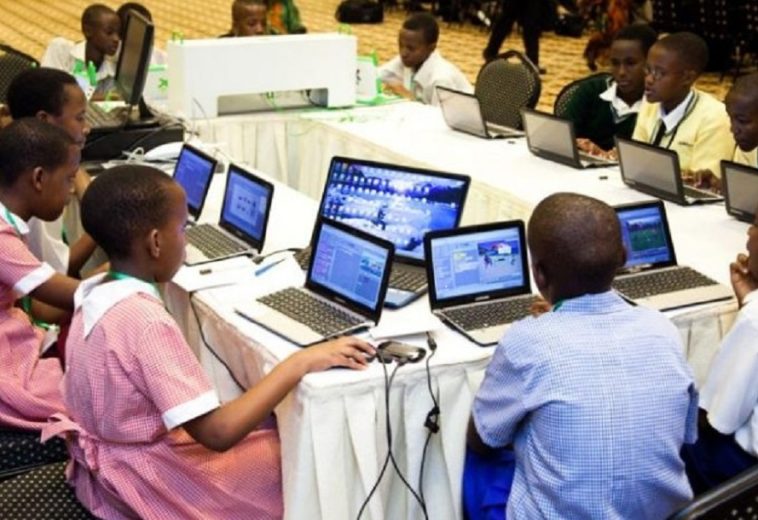Africa is boldly pushing the boundaries of space exploration, with satellite technology at the forefront. This milestone marks a decisive step towards technological independence as the continent forges its own path in innovation.
The continent’s fibre optic network has expanded significantly, growing from 936,102 km in 2018 to approximately 1,279,026 km by June 2023, according to Africabandwidth. By this time, about 60.5% of Sub-Saharan Africa’s population, or 709 million people, was within a 25km radius of an operational fibre optic network node, an increase from 57.1% (669 million) in 2022.
Fixed broadband subscriptions in Africa increased from 28 million in 2020 to 32.1 million in 2021. The continent is expected to see the highest growth rate in fixed broadband subscriptions between 2024 and 2027.
Africa is increasingly utilising Earth Observation (EO) data to tackle critical challenges such as agricultural productivity, environmental monitoring, and urban planning. For instance, Digital Earth Africa provides analysis-ready satellite data to support strategic decision-making across the continent.
Mobile connectivity is also improving, with companies like MTN collaborating with low Earth orbit (LEO) satellite providers to extend coverage to remote and underserved areas. They aim to achieve 95% broadband population coverage by 2025. According to the World Economic Forum, the EO industry alone could contribute over $2 billion annually by 2024, enhancing agricultural productivity, better regulating mining activities, and more.
The forum reveals that by providing ready-to-use data for decision-makers in government and business, the programme could boost Africa’s EO industry by $500 million by 2024 while providing $900 million in annual gains in agricultural productivity. This includes water savings, improved crop yields, insurance benefits, and reduced pesticide use.
Investment and Financial Overview
The African Union has identified space technology as a key priority in its Agenda 2063, with a focus on enhancing satellite infrastructure across the continent. To support this initiative, the AU has developed a comprehensive Space Policy, encouraging its member states to establish their own space programmes. This policy has been backed by various funding initiatives, including the establishment of the African Space Agency (ASA) in 2018, which received an initial $60 million investment.
Nigeria has invested over $500 million in satellite technology since launching its first satellite, NigeriaSat-1, in 2003. The country’s recent investment in the development of its communication satellite, NigComSat-1R, underscores its commitment to expanding its space capabilities.
South Africa has also made significant investments in its space program, with its national space agency, SANSA, receiving approximately $100 million in funding. The country’s development of the South African National Satellite (SANSAT) is a testament to its commitment to satellite technology.
Kenya is investing heavily in its space programme, with a focus on using satellite technology for developmental purposes. The country’s launch of the Satellite for Agriculture (KSat) is a notable example of its efforts, with a budget of around $50 million dedicated to this initiative.
Future Prospects
South Africa President Cyril Ramaphosa stated that “Africa must become a leading player in space technology. Satellite technology will not only enhance communication but also help us tackle challenges like climate change and disaster management.”
Major tech companies like Google and Meta have been investing heavily in Africa’s digital infrastructure. Google’s $1 billion investment in 2022, which included underwater cables to improve internet connectivity, is a notable example.
READ ALSO: Somalia: The Power of Satellite Technology in Optimising Crop Yields
According to Omdia research, Africa is expected to experience significant growth in its fixed broadband market, with 51 million subscriptions and a household penetration rate of 15.3% by the end of 2027. This represents a notable milestone on the continent’s journey towards achieving a connected digital future.
With these projections, Africa is on track to surpass its goal of achieving a household penetration rate of above 20% by 2030, as outlined in the Africa Broadband Vision 2030. This ambitious initiative aims to connect every African with broadband, leading to a stable and connected digital Africa by 2030.
The African Union’s emphasis on space technology as part of its Agenda 2063, which aims for a prosperous and integrated Africa, is set to drive the continent’s progress in space exploration and satellite technology.
The region’s push towards satellite sovereignty represents a significant leap forward in the continent’s technological capabilities. With substantial investments and successful case studies, African nations are enhancing their technological prowess and setting the stage for future innovations in space technology.


















